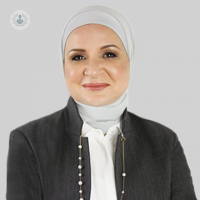Skin cancer: Detection, treatment and survival rates
Written by:Although survival rates for skin cancer are very high, a patient’s likelihood of being cured of their disease is dependent on how early it is detected and treated. In this informative article on skin cancer detection and survival rates, we hear from esteemed consultant dermatologist Dr Hiba Injibar on the key signs to be aware of and how the disease can develop if left untreated.

What are the warning signs of skin cancer?
Skin cancer appears on the body in many ways. It can look like:
- a changing mole or a mole that looks different from your others
- a dome-shaped growth
- a scaly patch
- a non-healing sore or a sore that heals and returns
- a brown or black streak under a nail
It can also show up in other ways. To find skin cancer on your body, you don’t have to remember a long list of signs to look out for. Dermatologists sum it up this way - It’s time to see a dermatologist if you notice a spot on your skin that:
- differs from any others
- changes
- itches
- bleeds
Does skin cancer spread quickly?
Melanoma can appear on parts of the skin which are not normally exposed to the sun and can grow very quickly, in some cases becoming life-threating in just 6 weeks. It can also spread to other parts of the body if it is not treated. Nodular melanoma is a highly dangerous form of melanoma that looks different from common melanomas.
Is skin cancer curable?
Fortunately, most skin cancers can be cured if they are diagnosed and treated at an early stage before they have had a chance to spread. In some cases, very advanced cases of melanoma can be life-threatening.
What can happen if skin cancer isn't treated?
That depends on the type of skin cancer. Non-melanoma skin cancers like basal cell carcinoma normally just grow locally and don’t spread. If you don't receive treatment for basal cell carcinoma (BCC), the skin cancer can slowly grow and invade deeper tissues like muscle and bone and cartilage. The BCC may also become painful and ulcerated, which can cause bleeding and infection.
The other type of non-melanoma skin cancer, squamous cell carcinoma, is more aggressive. If left for too long and allowed to grow too big, it can invade deeper structures and, rarely, can spread to other organs.
The most serious skin cancer, melanoma, is a very aggressive tumour which can spread to any organ and be life threatening or fatal. The best cure rates are when melanoma is caught and removed very early before it has had a chance to spread.
What is the success rate after skin cancer is treated?
Survival rates for patients whose skin cancer is detected and treated early are excellent – with the estimated five-year survival rate at over ninety-nine per cent. In the case of melanoma, this falls to seventy-one per cent when cancer reaches the lymph nodes and thirty-two per cent when the disease has spread (metastasized) to other of the body’s organs.
If you are concerned about the signs of skin cancer and wish to schedule a consultation with Dr Injibar, you can do so by visiting her Top Doctors profile.


